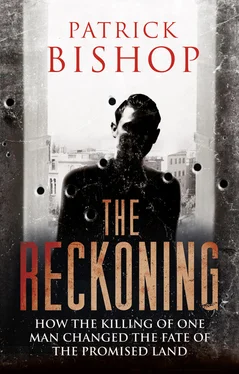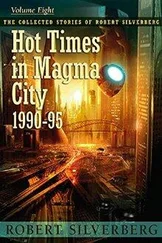‘Between us,’ wrote Morton, ‘we represented every conceivable stratum of life in the British Isles, from the heir of an impoverished Earl, products of exclusive public schools and graduates of famous universities to professional bruisers, coalminers, regular soldiers and really tough Tyneside Geordies who played a better game of football in their bare feet than they did with boots on.’ 11
The PPF had been set up as a gendarmerie, whose main function was as shock troops ready to bash the heads of unruly locals at times of unrest. The British element kept to themselves, treated their Palestinian colleagues with a condescension bordering on contempt and were not required to have any knowledge of either Arabic or Hebrew. Morton noted that ‘the policeman of any rank who took the trouble to learn even a smattering of everyday language in the vernacular was looked upon … with scorn, only very slightly tinged with respect or envy.’ 12
It would take Morton some time to settle into his calling. By the time of MacMichael’s arrival he was an up and coming young officer, winning the attention of his superiors with his efforts on the front line in the fight to suppress the Arab revolt. As the spring advanced it was clear that violence was not only intensifying. It was no longer an Arab monopoly.
On the hot afternoon of Monday, 11 April 1938, a crowded train stood ready to depart from the Iraq Petroleum Company pipeline terminal in Haifa Bay where oil from the Iraq fields ended its journey across the desert. There were several hundred passengers on board, most of them Arab workers who were returning home at the end of their shifts. Just before 4 p.m. an Arab sergeant of the Palestine Police was patrolling nearby when someone pointed out two suspicious-looking packages on board the train. He told the driver to delay departure while he removed the parcels. They were placed next to a guardhouse where one of them exploded, killing a Druze police constable. The second then went off, mortally wounding an Arab bystander.
Shortly afterwards, three buses taking Jewish workers from a nearby building site back to Haifa passed by. The Arabs decided that the Jews were to blame for the explosions. They started hurling stones and a small riot ensued with both sides exchanging missiles.
Now a police team from Haifa arrived on the scene. They were led by Sergeant Walter Medler, a conscientious and popular twenty-seven-year-old. By 5.15 p.m. calm had been restored and passengers were waiting to re-board the train. Then Sergeant Medler made another discovery. Stuffed under one of the seats was a sack, tied at the neck with string. Medler picked it up, threw it out of the window and ducked. Nothing happened. He stepped from the train and began, warily, to untie the string. A second later Medler was dead. So, too, was Constable Michael Ward, a twenty-two-year-old only recently arrived in Palestine who was standing behind him. The explosion, it was learned later, was caused by a time bomb – quite a sophisticated device by the standards of the time and place. 13
It had been Medler’s bad luck to be called to the oil terminal. As a junior sergeant at the Haifa police station he worked under Geoffrey Morton, acting as his deputy on many operations. That day Morton had taken a squad on a duty that was becoming part of their regular routine. Twenty miles to the south of Haifa at Wadi Hawareth, Bedouins were being evicted from land they had grazed their livestock on for generations. It had been sold over their heads to Jews who planned to build a kibbutz and the police were there to intervene in the likely event of trouble. It was to Morton and many other policemen ‘one of the more distasteful tasks’ they were asked to perform. 14Normally, Morton would have taken Medler with him and left his senior sergeant, Jack Bourne, behind to deal with emergencies. He wrote later that on this day, however, ‘for some reason which in retrospect I have never been able to understand, I decided to take Jack Bourne with me to Wadi Hawareth and to leave Wally Medler in charge in Haifa’. 15The eviction went off without incident. Morton returned from a long and dispiriting day to be told Medler and Ward were dead. The death of comrades was almost a routine event by now, but the news hit Morton very hard. Medler was not just a valued colleague but a close friend. He came from Norwich where his father was a wholesale fruit merchant and went to the city’s Junior Technical College, a pioneering academy for the sons of ordinary families, but left early to work in a solicitor’s office. Then, according to the local newspaper report on his death ‘the opportunity of seeing something more of the world and the prospects of advancement attracted him to the Palestine [Police]’. His hopes had been realized. In 1935 he became the youngest sergeant in the force. He was a good sportsman and the police welterweight boxing champion. 16
Even allowing for the generosity shown to the newly (and violently) deceased it is clear that Medler was an exceptional man. ‘Trim and neat in figure, whether in charge of a traffic escort or on the sports field, in giving evidence in court or in the boxing ring, Walter Medler bespoke his character’ ran the appreciation by ‘BWF’ in the Palestine Post . He was ‘an omnivorous reader, yet not a bookworm, a popular messmate and comrade … the all-round athlete who had time for good books, good concerts, good contacts and wholesome entertainment’. Medler’s rank, BWF concluded, might be that of ‘second class sergeant’, but ‘his rank among his many friends was “prince”’. 17
Morton, like most of his colleagues, took a cheerfully fatalistic view of life and death but the loss of his friend brought on an uncharacteristic fit of the blues. ‘Haifa lost much of the savour it had previously held for me,’ he wrote. ‘I was lonely and miserable and found it difficult to concentrate on my work.’ 18After hearing the news he went to say his farewell to his friend in the mortuary. A silver pencil, splintered by the explosion, was sticking out of his breast pocket. He took it and kept it as a memento for the rest of his life. 19Among Morton’s papers is a photograph of Wally Medler. It is a well-framed shot showing him sunbathing with another policeman, Arthur Brument, next to the ruins of a Crusader castle on the Mediterranean at Athlit, just south of Haifa. Even though it is in monochrome you can almost feel the heat of the burning sand and admire the depth of the two men’s suntans.
Who had planted the bombs? The likeliest culprits were right-wing Zionists, angered by the campaign of murder and arson being waged by the Arab rebels against the Jews of Palestine. In the face of Arab aggression, the instinct of the Zionist establishment was to exercise havlagah – to show restraint and to suppress the desire to hit back. Such a stance was both moral and practical. Retaliation would almost certainly mean killing innocent Arabs along with the guilty, and undermine Zionism’s claim to high ethical standards both in its aims and in its conduct.
In showing restraint the leaders of Palestine’s Jews also hoped to gain political advantage. The great majority of Zionists, left and right, believed that their interests lay in cooperating with the empire. By holding back they were relieving the hard-pressed security services of an extra burden. Their good behaviour, they calculated, might persuade the British to look more favourably on their ambitions for statehood.
As the Arab revolt rumbled on and the murder of innocent Jews persisted, patience with havlagah began to wear thin. The political divisions of the Jews in Palestine corresponded to the politics of the countries they had left behind. The ideologies of old Europe were mirrored in the numerous parties and organizations that flourished in the Holy Land and the political spectrum contained communists, socialists and those whose aesthetic and beliefs bordered on fascism.
Читать дальше












